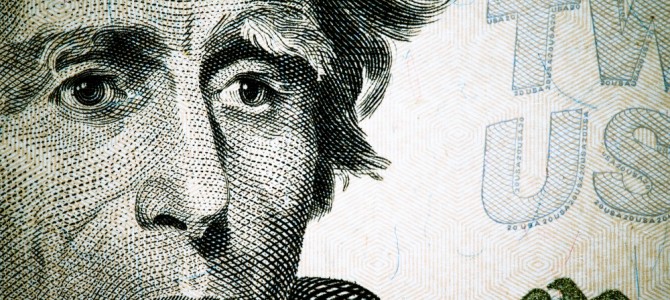
It seems like only yesterday the world was prepared to say goodbye to Alexander Hamilton, the man whose founding role in the American financial system more than earned him a place on a dollar-denominated bill. We all know the reasons Hamilton became the prime candidate for expulsion from the monetary pantheon. But no one could have imagined he would have been saved by a bit of musical theater.
Now it is all but certain that Hamilton, rescued by “Hamilton,” will stay on the $10. So we roving busybodies, always alert for an opportunity to act out who we are and avoid sitting still too long in the bargain, have zeroed in on alternatives. Surely the chance to change our national symbolism must not go by the boards.
In the name of national unity, it seems obvious that Andrew Jackson should go. The liberal reasons to throw him over are obvious enough. But there is also a raft of reasons why conservative people should sacrifice Old Hickory.
Jackson Could Be a Peace Offering
Already, enterprising minds are realizing how fun it would be to cut loose altogether from the hidebound traditionalism of dead presidents and solemn monuments. In the interest of breaking up “the whiteness and straightness of the history most of us grew up with,” New York’s Christopher Bonanos proposes that each bill be made “thematic,” pairing stubbornly persistent presidents with interesting, important, and inclusive figures from throughout American life. As precedent he cites the delightful diversity of bills of yore.
There are some immensely artful examples in our national back catalogue. But one kind of conservative will immediately object that this is a perfect example of the problem with swift and sweeping change. You start out with a grand and beautiful vision, and you end up with protracted and bitter haggling.
It’s not just ideological. Each person is sure his view is too valid to exclude, that his interest edges out his rival’s. In the supervening interest of time and durability, the choice is likely assigned to some magistrate or overseeing body. An organic revolution becomes a transformation from above. Tale as old as time. Restricting ourselves to booting Jackson slows the tempo of change, saving us from chaos, arbitrary rule, and our own too-high estimation of ourselves.
Or Whiners Could Get a Life
A different kind of conservative will start out somewhere different, asking don’t you have something better to do? If you need to be busy creating change in the world, why set your sights on the whole iconography of American money? Perhaps try something a bit more local, a bit more practical, or even, in good liberal style, something aimed at benefiting the least well-off?
Hasn’t something gone very wrong for liberalism, this kind of conservative would ask, when semiotics and curation take precedence over the real lives of struggling people? Isn’t there something mistaken in believing that the place to begin in our quest for justice is ensuring the disadvantaged have more favorable icons gazing back at them? Giving Jackson the boot shows we neither make too much nor too little of our symbolic iconography.
Yet a third kind of conservative, however, will begin with the narrow matter at hand: whether, as a matter of prudential judgment, anyone on the currency could be dropped without detriment, and maybe even to a modest advantage.
Here Jackson is in trouble again. He has been associated almost since the beginning with a string of classically un-conservative features. He was the kind of nationalist who cannot help but concentrate centralized power. He did not respect the rule of law. He seemed to have no moral sense of guilt. His presidency broke the Founders’ political lineage. He was too much of a cult figure. Careful deliberation suggests we should do without him on the $20.
The Two-Word Case Against Jackson
But even conservatives have justifiable self-interests and right now the best case for booting Jackson is two words long: Donald Trump. Now that many on the Right believe a crass and misguided populism is in real danger of destroying the Republican Party, stripping the populists of Jackson is more than a retaliatory stick in the eye. It is a reminder that if Jackson was bad, at least he was a proper leader in the primal sense, as a military man.
Key to “Jacksonianism”—a point often lost in the present-day melee—is the idea that warriors ought to have a greater say. There’s a principled case for that viewpoint, but it is light years away from today’s pseudo-Jacksonianism. Here conservatives’ self-interest dovetails with the national interest.
Most conservatives will immediately understand there are virtues to a more military society that are not to be found in a merely more militaristic one. Militant populism that comes from people with no military experience is all but guaranteed to be dumb and dangerous in a way warriors are not.
You can see this in our police departments, where veterans in law enforcement are often apt to view their jobs in less theatrical or performative ways than macho civilians playing army on the force. Above all you can see it in the way we turn everything, rhetorically, into an “all-out war”—an absurdity for anyone who has actually seen even minor combat. Imagine how bad Jackson would have been without the discipline of having served.
Conservative, liberal, or neither, ridding the $20 of Jackson ought to pierce the fog of Trumpism—not only by rebuking a populist icon, but by reminding the populists that their militant vitriol is too lacking in martial virtue. In that sense, the proper presidential symbol of a politics more military isn’t hard to find. He’s graced our currency before—from 1971 to 1978, on the silver dollar.
For the good of the country, let’s replace Andrew Jackson with Dwight Eisenhower.









